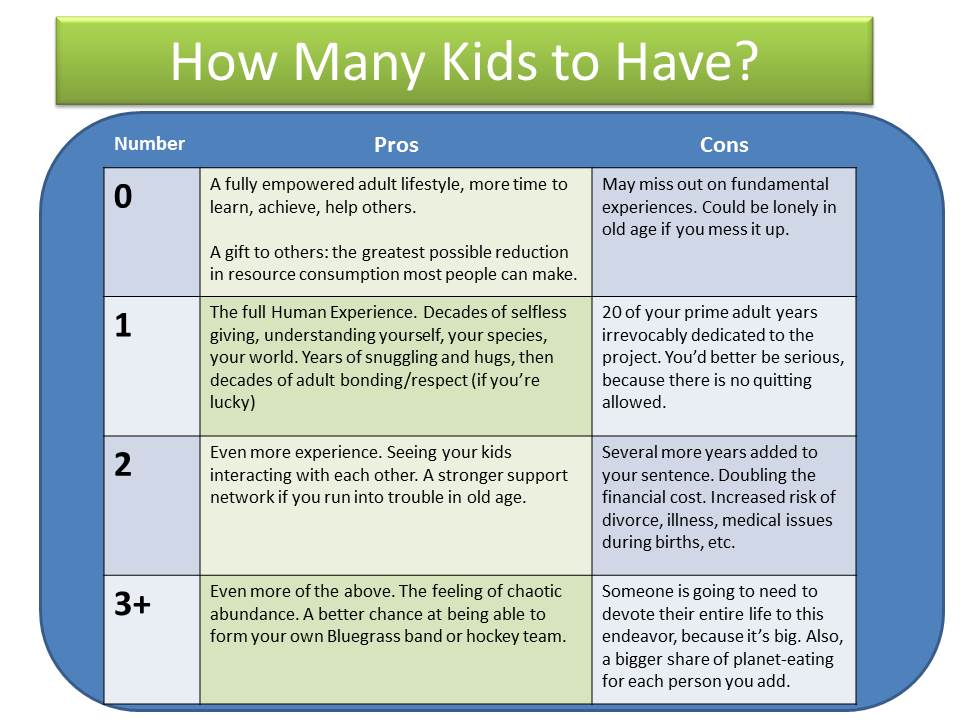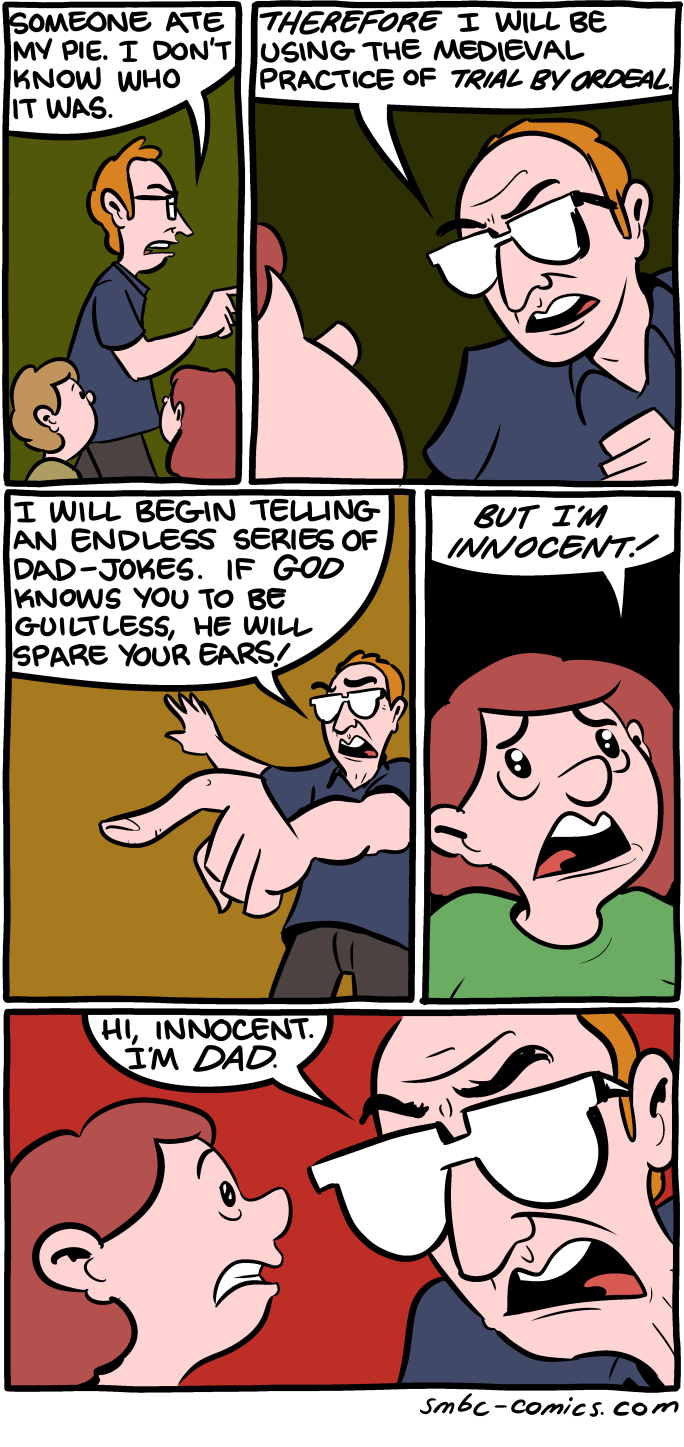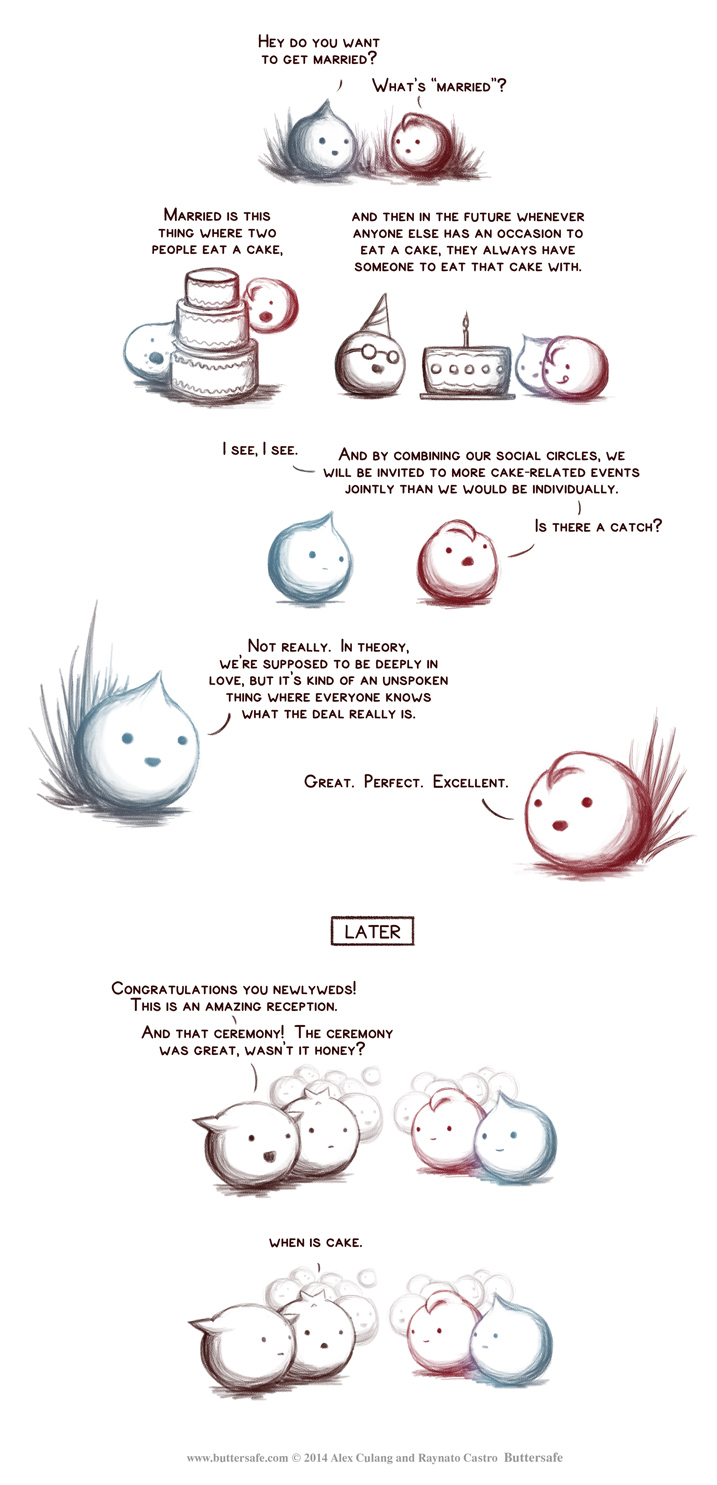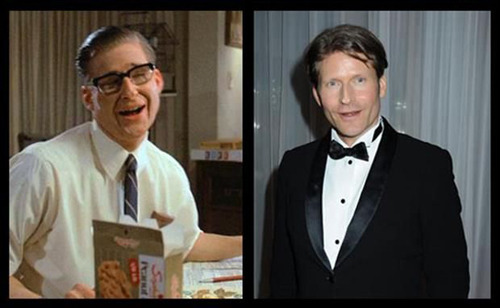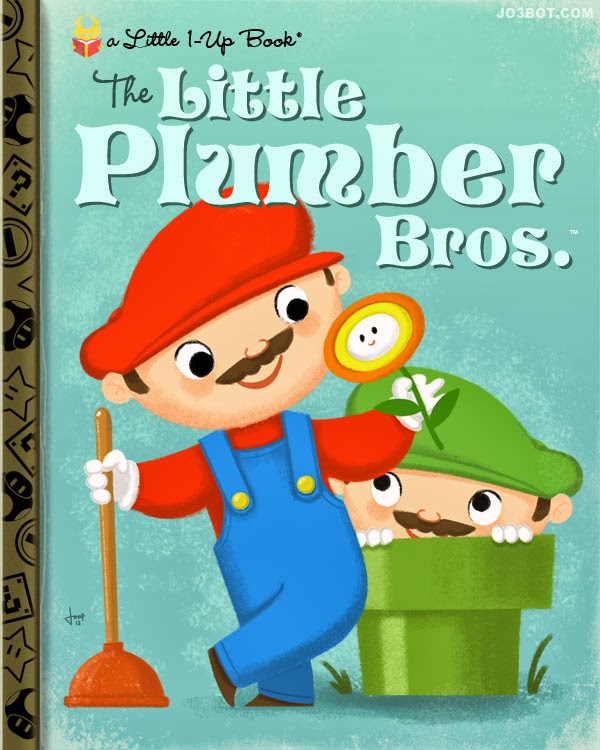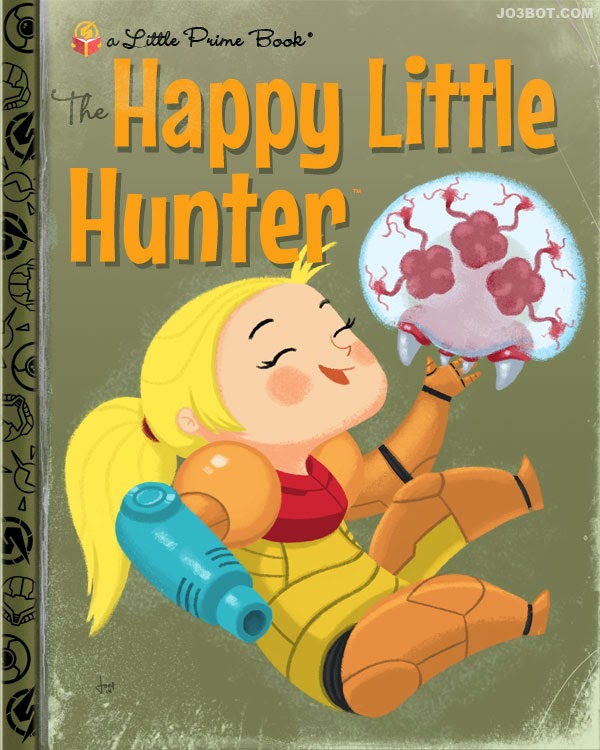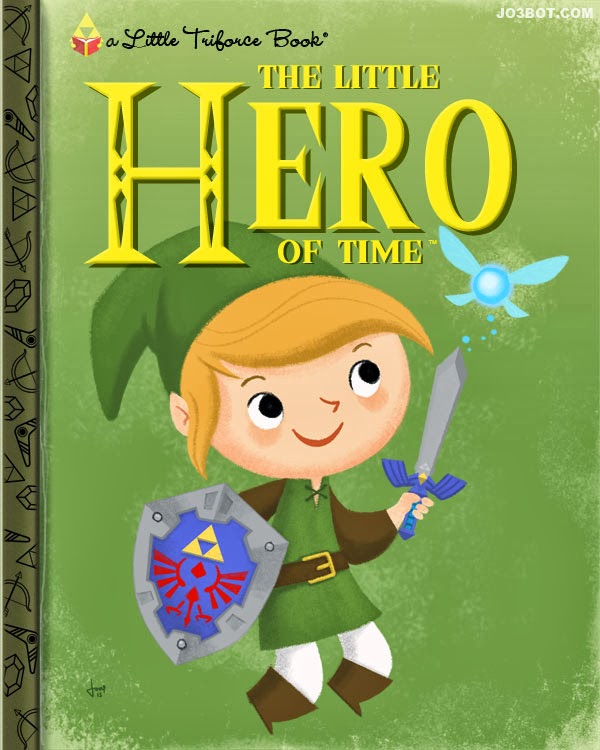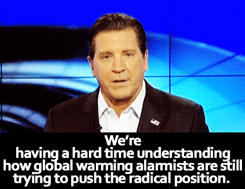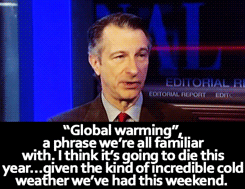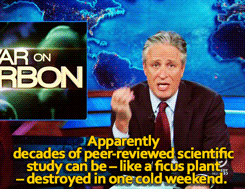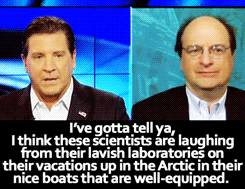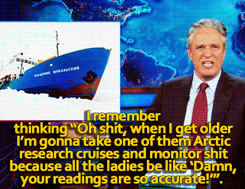| Piled Higher & Deeper by Jorge Cham |
www.phdcomics.com
|
|
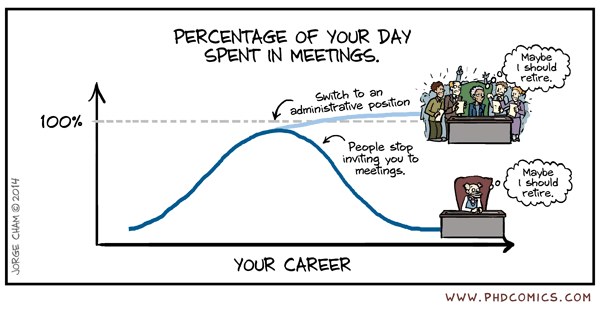 |
||
|
title:
"Percentage of your day you spend in meetings" - originally published
10/20/2014
For the latest news in PHD Comics, CLICK HERE! |
||
Shared posts
10/20/14 PHD comic: 'Percentage of your day you spend in meetings'
how to manage off-site employees
Anne AlvaradoSo you can add it to your RSS if you want. Love.
A reader writes:
I’ve recently started managing two employees who work off-site — one from a branch office across the country and one who works from home. I’m used to having my team in the same location as me and I’m uneasy about how to manage well from a distance, especially when it comes to making sure they’re on top of their work.
In some ways, managing off-site employees isn’t much different from managing on-site staff, but it does require you to manage really well. While you can sometimes get away with being more ad hoc in managing on-site staff – for instance, skipping one-on-ones in favor of grabbing whatever face time you can during the week – that approach can blow up when it comes to remote employees.
You can read my advice to this letter-writer over at Daily Worth today.
how to manage off-site employees was originally published by Alison Green on Ask a Manager.
ebooks choices and the missing soul of librarianship
We protect each library user’s right to privacy and confidentiality with respect to information sought or received and resources consulted, borrowed, acquired or transmitted.
American Library Association Code of Ethics
Yesterday I watched as Adobe Digital Editions told Adobe what book I was reading — title, author, publisher, year of publication, subject, description — and every page I’d read, and the time at which I read them. Adobe’s EULA states that it also collects my user ID and my general location.
I was able to watch this information be collected because it was all sent unencrypted, readable to any English-speaking human with access to any of the servers it passes through, in whatsoever jurisdiction, and also (if your wifi is unencrypted) the open air between my laptop and my router.
The Council of the American Library Association strongly recommends that… [circulation and other personally identifying] records shall not be made available to any agency of state, federal, or local government except pursuant to such process, order or subpoena as may be authorized under the authority of, and pursuant to, federal, state, or local law relating to civil, criminal, or administrative discovery procedures or legislative investigative power [and that librarians] resist the issuance of enforcement of any such process, order, or subpoena until such time as a proper showing of good cause has been made in a court of competent jurisdiction.”
Policy on confidentiality of library records
Your patrons’ reading information is already part of a warrantless dragnet. Because it has been transmitted in cleartext, the government needs no further assistance from you, your patrons, or your vendors to read it. Even were they to present you with a valid subpoena, you would be powerless to resist it, because you have, in effect, already written the information on your walls; you have no technical ability to protect it.
The American Library Association urges all libraries to…
- Limit the degree to which personally identifiable information is collected, monitored, disclosed, and distributed; and avoid creating unnecessary records; and
- Limit access to personally identifiable information to staff performing authorized functions; and…
- Ensure that the library work with its organization’s information technology unit to ensure that library usage records processed or held by the IT unit are treated in accordance with library records policies; and
- Ensure that those records that must be retained are secure; and
- Avoid library practices and procedures that place personally identifiable information on public view.”
If Adobe Digital Editions is part of your technical stack — if your library offers Overdrive or 3M Cloud Library or EBL or ebrary or Baker & Taylor Axis 360 or EBSCO or MyiLibrary or quite possibly other vendors I haven’t googled yet — you are not doing this. You cannot do this.
…ebook models make us choose. And I don’t mean choosing which catalog, or interface, or set of contract terms we want — though we do make those choices, and they matter. I mean that we choose which values to advance, and which to sacrifice. We’re making those values choices every time we sign a contract, whether we talk about it or not.
me, Library Journal, 2012
In 2012 I wrote and spoke about how the technical affordances, and legal restrictions, of ebooks make us choose among fundamental library values in a way that paper books have not. About how we were making those choices about values whether we made them explicitly or not. About how we default to choosing access over privacy.
We have chosen access over privacy, and privacy is not an option left for us to choose.
Because: don’t underestimate this. This is not merely a question of a technical slip-up in one version of an Adobe product.
This is about the fact that we do not have the technical skills to verify whether our products are in line with the values we espouse, the policies we hold, or even the contracts we sign, and we do not delegate this verification to others who do. Our failure to verify affects all the software we run.
This is about the fact that best practice in software is generally to log promiscuously; you’re trained, as a developer, to keep all the information, just in case it comes in handy. It takes a conscious choice (or a slipshod incompetence) not to do so. Libraries must demand that our vendors make that choice, or else we are in the awkward position of trusting to their incompetence. This affects all the software we run.
This is about the fact that encryption products are often hard to use, the fact that secure https is not yet the default everywhere, the fact that anyone can easily see traffic on the unencrypted wireless networks found at so many libraries, the fact that anyone with the password (which, if you’re a library, is everyone) can see all the traffic on encrypted networks too. This affects all the software we run.
This is about Adobe. It is not just about Adobe. These are questions we should ask of everything. These are audits we should be performing on everything. This affects all the software we run.
I am usually a middle-ground person. I see multiple sides to every argument, I entertain arguments that have shades of the abhorrent to find their shades of truth. This is not an issue where I can do that.
If you have chosen, whether actively or by default, to trust that the technical affordances of your software match both your contracts and your values, you have chosen to let privacy burn. If you’re content with that choice, have the decency to stand up and say it: to say that playing nice with your vendors matters more to you than this part or professional ethics, that protecting patron privacy is not on your list of priorities.
If you’re not content with that choice, it is time to set something else on fire.
Great News: You’re Allowed To Have Only One Kid!
Anne AlvaradoNot really sure where I'm going with sharing this; only that so much of what he prractices seems impossibl with two kids. Or maybe it would be possible if one of us gave up a job to do daycare/after school tutoring, we moved hella west to cheapo-house land, and lived with the insecurity that single-income + stay-at-home parent brings. Nah. On second though I love our two boys and two incomes. Daycare isn't forever.
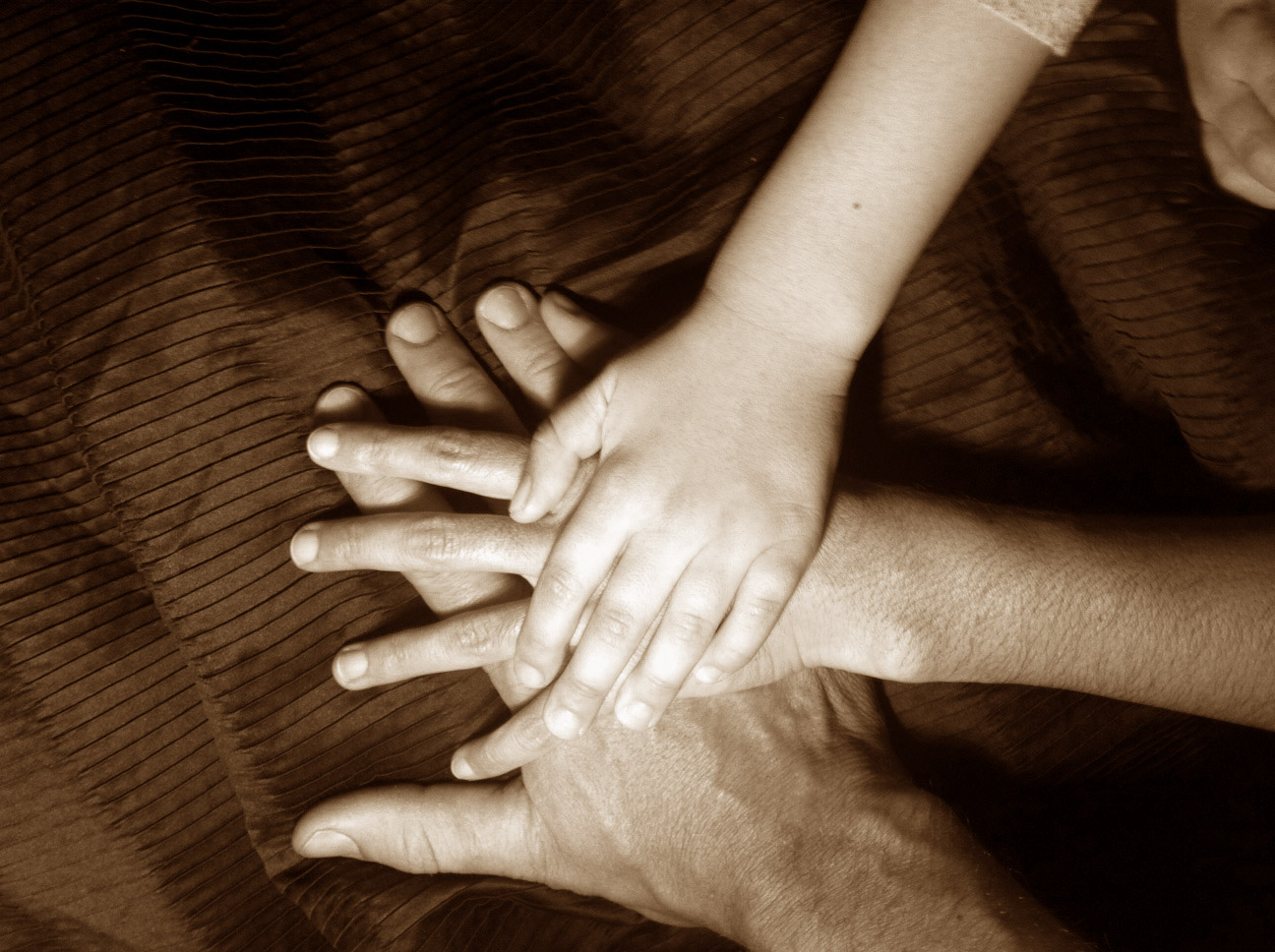
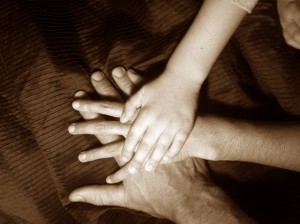 It was a black and frosty night, sometime in the dead of winter 2007. I was in the rocking chair holding my baby son, who was about one year old at the time. I was offering him a bottle and I knew he needed food, but he was upset and had been screaming for much of the night. My wife and I had been trading off baby shifts as usual so each of us could get half a night’s sleep, which is a very helpful tactic since the sleep deprivation stage of raising a child can go on for more than a year.
It was a black and frosty night, sometime in the dead of winter 2007. I was in the rocking chair holding my baby son, who was about one year old at the time. I was offering him a bottle and I knew he needed food, but he was upset and had been screaming for much of the night. My wife and I had been trading off baby shifts as usual so each of us could get half a night’s sleep, which is a very helpful tactic since the sleep deprivation stage of raising a child can go on for more than a year.
“Wow, raising kids is an incredibly difficult thing”, I thought to myself, “But worthwhile in so many ways. Every day this little guy advances through more milestones, and it’s amazing to think he will be walking and talking pretty soon, bonding with his parents over common interests and learning, and maybe even staying up at night to care for his own son or daughter someday. It’s too bad we have to start all over in only a year, to have a second child and go right back to zero. I’ve survived this first year of sleep deprivation, but can’t help but to dread two more years of it”.
Time went on, and we continued to reap all the joys and strains of parenthood. We took him on hikes and reacquainted ourselves with the joy of being alive, through the eyes of someone who is seeing it all for the first time. The three of us took trips together, read books, made snow forts and blanket tents and wooden boats, and mixed it up with family and close friends often.
But it wasn’t always easy, or even fun. Our marriage was stretched to the thinnest of threads at times, as the needs of the child displaced the needs of a relationship. Personal interests and even a moment’s peace and quiet were long forgotten. Social and travel opportunities were postponed for years, or indefinitely, because they weren’t compatible with our son’s temperament or limited diet, no matter how much we worked on the various issues. In the thick of the bad times of raising a young child, you sometimes feel like your whole life has been one long screaming, screeching, smashing, crying argument.
Luckily, you tend to wake up the next day and it’s back to joy. But it is still essential to say what most people avoid saying: parenting is more than just curling up on a couch with their cute little faces gazing at you while you read them an adventure novel (which is the way I always pictured it).
So anyway, one day we had a two-year-old son and thus it was time to produce the next child. He was sleeping well and flourishing beautifully, and the two children would be spaced closely enough that they could be friends eventually. We dutifully started making the arrangements, and I braced for the next round of caring for an infant. I looked far into the future and pictured my future 8-year-old explaining scientific concepts to the 5-year-old using the teaching medium of Lego, and determined that all would be well. Then I pictured them at 28 and 25, and it was even better – helping them with their houses and careers, traveling together meeting their girlfriends or boyfriends or spouses, and a lifetime of friendship. If only there were a way to get there without the torture stage.
At that moment, my wife came home from the library with a nice load of books. One of them was “Parenting an Only Child”, a book about only children and how most of the conventional assumptions about them are wrong. They do exceptionally well as children, flourish socially, and end up with lives that are at least as happy as people who grew up in larger families.
Thinking about it, this was the main reason I was assuming we’d have two kids. You have the second one as a gift to your first one, so they can go through life together. After all, I have two older sisters and a younger brother, and my wife has a younger brother as well. We both have fond memories of our childhoods together and we get along with them well today.
But on further reflection, most of my social life as a kid was with other kids that were closer to my own age. And my relationship with my parents was probably diluted by the high effort (both financial and emotional) they had to put into raising such a large flock of us. Their marriage broke up towards the end of that multi-decade effort, and I wouldn’t be surprised if the strain of kids was part of it. Hell, a full 40% of my own friends and acquaintances who had kids when we did in 2006 are already divorced. So once again, there are negatives to be considered alongside the positives.
The bottom line is that we read the book, and then poked through a few other books and articles on the same topic, and I was sold on the idea.
Mrs. Money Mustache was thrown slightly off balance, since she had brought home the book expecting discussion rather than such an immediate transformation, but the more we discussed the issue, the more we realized it was the right one for us.
Having (or not having) kids is an extremely personal decision, and it’s not something that I (or your friends, parents, in-laws, church, government, religion, or society) should really have much say in. It’s between you and your partner, and even then it is questionable practice to try to force a partner into having more of them than he or she wants.
As a person who tries to put things into a logical perspective, kids are a tricky one. After all, it may seem somewhat illogical to voluntarily create a new being, and make such a big sacrifice to your own life to support it. Especially since there is no shortage of need in the world – why not help others instead of creating still more need?
On the other hand, if your goal of living is to understand what being a Human is all about, reproduction is pretty logical. It is the reason for all life on the planet, and it really the sole purpose of your existence from an evolutionary perspective. It would be hard to say you’ve had the full experience of humanity without experiencing this core part of it. Every cell in your body exists just to allow this to happen. That still doesn’t mean that you should have kids, it’s just an explanation for why it could be considered logical at some level.
The bottom line is that there are enormous positives and negatives that go along with your baby-making decisions, and it helps to step back from our dumb evolutionary programming (see the part about every cell in your body above), and realize that following your immediate emotions is not usually the path to the happiest life. You could even make an oversimplified decision-making chart on the issue. For me, it might look like this:
For others, the chart will look totally different, and that’s fine too. The real point I wanted to make here is that it was nice to find out that One Kid is a wonderful way to go, and how nicely it has been working out for us. If you didn’t know you were allowed to do this without being perceived as a weirdo, I hereby give you permission.
Further resources:
Parenting an Only Child: the Joys and Challenges of Raising Your One and Only by Susan Newman, can probably be found in your Library, as well as possibly on Better World Books (used) and Amazon. And there are many other great books, documentaries, interviews and videos about the idea.
'Back to the Future' Makeup Aging vs. Reality [tiwuno]
July 25, 2014
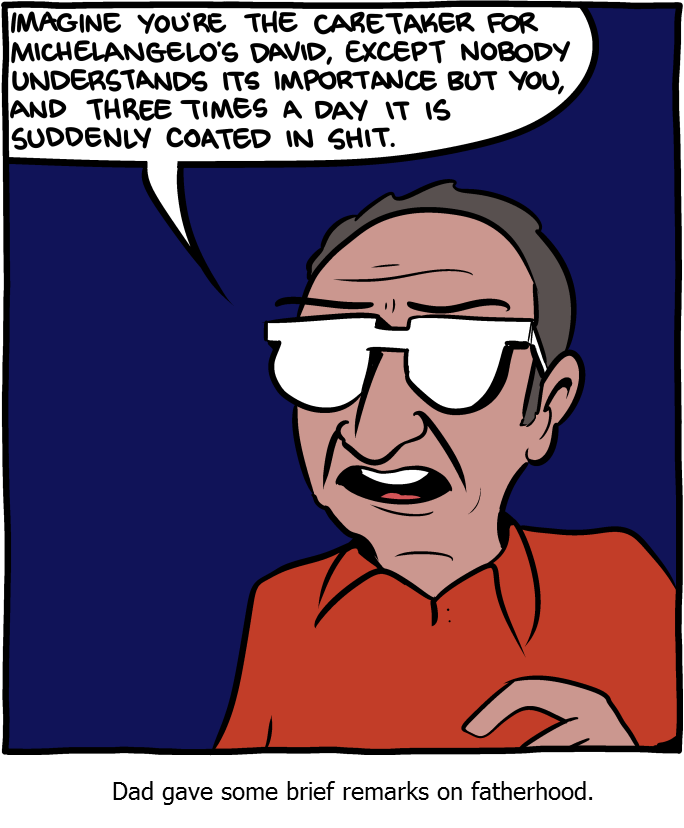
So, it turns out yesterday's comic was super similar to this Abstruse Goose comic. Thanks for alerting me. As far as I know, I had never seen that particular comic. Sorry!
Fat, Impotent Roosters Are Making Chicken More Expensive
Somewhere, Foghorn Leghorn is weeping. Reuters reports that fertility problems afflicting an important breed of rooster are leading to a shortage of chickens raised for slaughter and pushing up poultry prices in stores. What's more, it looks like only evil humans are to blame for the current mess.
The rooster in question is Aviagen Group's standard Ross male, which sires up to 25 percent of the chickens raised for slaughter in the U.S. Chicken producers have found that about 17 percent of eggs laid by Aviagen hens who mated with this kind of rooster failed to hatch—above the average failure rate of 15 percent. Scientists investigated and came to the shocking conclusion that genetic engineering had made the roosters susceptible to overfeeding.
Here's Reuters talking to Sanderson Farms' chief financial officer Mike Cockrell:
Aviagen sent a team of scientists to Sanderson last autumn to study the issue and has acknowledged that an undisclosed change it made to the breed's genetics made the birds "very sensitive" to being overfed, he said.
"We fed him too much. He got fat. When he got big, he did not breed as much as he was intended to," Cockrell said about the breed of rooster. "The fertilization went way down, and our hatch has been way down."
Demand for chicken has been up this year as prices of other foods and meats in particular have surged. A deadly pig virus has decimated the pork supply while the domestic cattle herd is at its lowest level in more than 60 years. If that Fourth of July cookout seemed to take a bigger bite out of your wallet this year, it wasn't just you. The cost of grilling has reached an all-time high this year, according to the official Bloomberg-complied barbecue index.
In its June report on livestock, dairy, and poultry, the U.S. Department of Agriculture noted that the poultry production forecast for the year had been lowered by 195 million pounds. The report also observes that hatching eggs in the first four months of 2014 were down slightly from the previous year.
Aviagen has replaced the impotent rooster breed with another kind of bird. Preliminary results of mating with hens are encouraging, and Sanderson Farms expects to have swapped out its roosters entirely by the fall. The company did not specify what will happen to its current male fowl, but we can only assume it won't be good. For Sanderson, some roosters are more equal than others.
05/05/14 PHD comic: 'What to call your Academic Event'
Anne AlvaradoI will attend the next "WORLD CONGRESS" with you
| Piled Higher & Deeper by Jorge Cham |
www.phdcomics.com
|
|
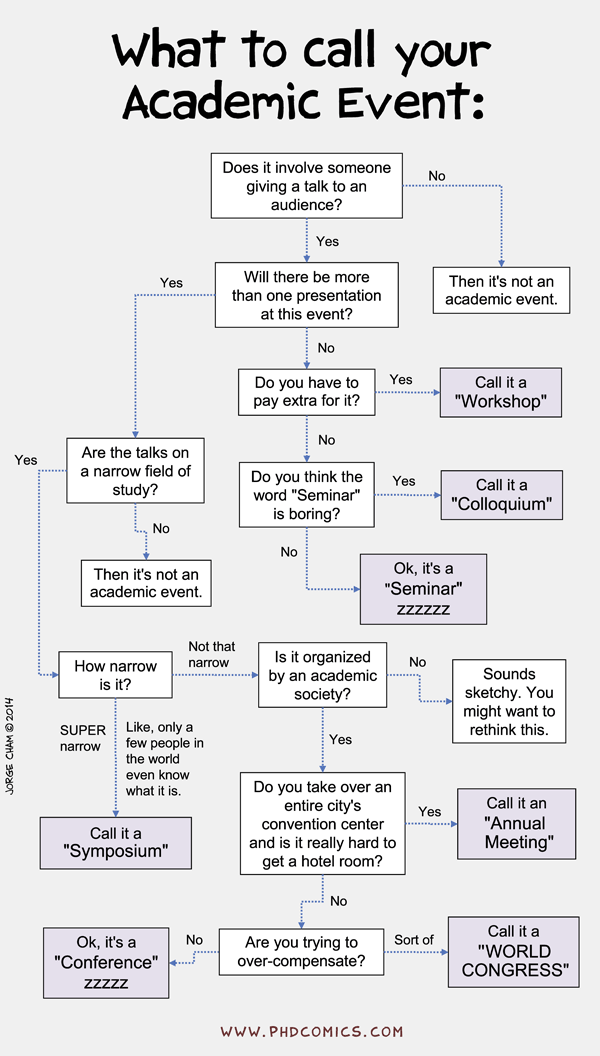 |
||
|
title:
"What to call your Academic Event" - originally published
5/5/2014
For the latest news in PHD Comics, CLICK HERE! |
||
05/23/14 PHD comic: 'Done'
Anne AlvaradoScience!
| Piled Higher & Deeper by Jorge Cham |
www.phdcomics.com
|
|
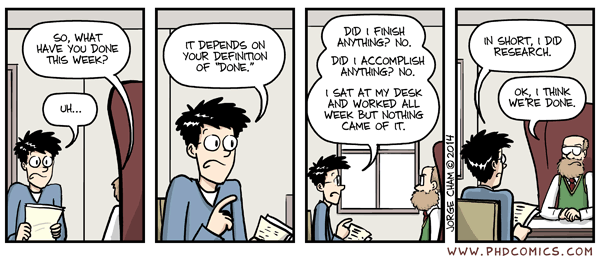 |
||
|
title:
"Done" - originally published
5/23/2014
For the latest news in PHD Comics, CLICK HERE! |
||
Dr. Oz gets lambasted by Claire McCaskill. Now onto the rest of the weight-loss fraudsters.
Yea! Let’s pretend that all I needed to do was take the stairs once in awhile!
I cannot tell you how thrilled I was yesterday when Sen. Claire McCaskill finally got Dr. Oz in her sights. Dr. Oz may seem like a fun guy who just is overly obsessed with bowel movements on his show, but in reality he’s a straight-up predator who uses his credentials as a medical doctor to scam a mostly female audience out of their hard-earned dollars by preying on their need to believe that they can lose weight and achieve conventional beauty standards without having to invest tons of time and energy—time and energy most do not have—into it. Dr. Oz shills for one “miracle” “fat-buster” after another, raking in money from desperate women, all while smugly pretending he’s just a nice guy trying to give out medical advice. The fact that, as Dave Weigel notes, low income women who have poor access to decent medical care tend to turn to TV for advice just makes the whole thing even more disspiriting. So that’s why it’s fun watching Sen. McCaskill rip this fraud a new one.
The prevalence of weight loss scams, which are assuredly one of the biggest consumer fraud markets out there, demonstrates succiently why the growing importance of feminism to the skeptical movement is a good thing, even if it interferes with a few sexual harassers who see conventions as hunting grounds for prey. (Aw, poor harassers! They are very butthurt.) The reason that people, mostly women, turn to these fraudulent products again and again is that they are trapped in this unwinnable situation, where you are both supposed to be skinny and “hot” but also not supposed to work too hard at it. I was perusing CreepyPMs on Reddit this weekend, like you do, and saw yet another example of this:
The fact that she felt the need to defend herself at all makes me sad. This guy was clearly just being a dick, but you definitely see, over and over again, that there’s this myth that being a supermodel is really easy and just a matter of a modicum of self-control and the very occasional amount of exercise. Jezebel reported on a study in Canada, for instance, that showed that when they put sedentary people on a treadmill, most of them wildly underestimated how hard they had to work to get to the “vigorous” level.
Part of the problem is there is an entire industry geared towards pushing the fantasy that weight loss or weight maintenance is super easy and that anyone who can’t achieve it must just be lazy. I generally find Tori Spelling repulsive, but I did appreciate her coming clean about how she caved into pressure to lie about her regime when it came to losing weight after having a baby.
The mom of four told Us in April 2013 that she had dropped the weight through a combination of low-impact cardio and a “healthy” diet of fish, veggies, soups, and “sensible” snacks like rice cakes, edamame, hummus, and avocado. However, in Spelling It Like It Is, she confesses that she actually lost it by basically starving herself.
“I really don’t exercise much, period,” she writes. “So I took off my weight the old-fashioned way. I like to call it the Just Keep Your F–king Mouth Shut and Eat Air diet. It’s all the rage.”
Spelling says she lied because she thought the truth wouldn’t go over well with her fans. “My publicist had given me clear instructions about what to say about my weight loss,” she explains in her book. “Women didn’t want to know that I had lost weight through dieting, not exercising. I didn’t want to be the a–hole who didn’t work for it. So I said that I swam. It was sort of a bad choice. I can’t do much more than a doggy paddle.”
And, of course, the exercise that is peddled as all you “need” to do in order to lose dozens of pounds is a little hopping around or light bicycling—can’t sweat so hard your make-up runs, ladies!—and the result is that you have a nation of women who have been told that if they can’t stay thin while eating heartily and doing nothing more than light exercise, then there must be something wrong with them. Add to it the unfortunate scientific realities that show that major weight loss leads to drastically lowered metabolism that makes keeping it off nearly impossible. Also toss in the fact that many Americans just don’t have the time and energy to devote to diet maintenance and fitness. Put it all together, and the weight loss supplement industry has a perfect victim pool of people desperate to know the “secret”.
So it’s very good to see Dr. Oz being raked over the coals in front of a national audience for this. I hope to see more of this sort of thing in the future.
Raising Boys: Just Put Your Penis Anywhere
“Will, did you pee in this?”
I knew the answer before my wife asked the question. I was giving Sam a bath when I noticed a horrible smell. It was pungent and stale, and I immediately knew it was piss — I just didn’t know where it was. The toilet water was clear, Sam didn’t let loose in the bath, and all the rugs on the bathroom floor felt dry.
That’s when my eyes settled on the long, white, plastic cylinder I use to fill up with water and wash Sam’s head. And suddenly everything clicked.
I knew Will had peed in it during his shower and just left it there.
I took my findings to MJ before we confronted Will, but she didn’t believe me. Why would anyone piss in a bath toy, she asked. Who would ever think to do that and for what earthly reason? She said it’s crazy, it makes no sense, it’s completely illogical.
But it made sense to me.
When you’re raising boys, you have to know they will be slightly obsessed with their penises and there’s a lot of (ahem) experimentation in our younger years. So, being equipped with a penis and having endured the weird trials and tribulations during my younger years, I told her I get it. You want to see if it’ll fit in there and if you can fill it up with pee or not. But as I told her it made perfect sense to me, she was looking at me like I was the nuttiest person on Earth.
“What other weird crap did you do with your penis?” she asked.
Some things are best left unsaid to your wife. I know this to be true, and discussing the awkwardness of youthful bodily experimentation with your spouse surely makes the list. But since she seemed to be genuinely interested and as it involved our son, I went ahead and allowed her a peek behind the curtain.
“Well, for starters, you put it on just about everything,” I said.
“You put it on things? Like what?” she asked, wearing a look of growing concern.
“Let’s see, I put it on the fridge, in the fridge, counter tops, the table, and I had the ill-advised idea once to use one of those clips you use to close bags of chips. That one didn’t work out so well.”
The look on her face was one of total bewilderment and disgust. Also, outright fear.
“Are you saying my son is going to put his dick on our table and counters,” she asked, wide-eyed.
“If he hasn’t already,” I said.
“God help me,” she said near tears. “Boys are disturbed.”
**********
Confronting Will about it was going to prove tricky because I wanted to be sure we let him know it’s natural to experiment like this when you’re young, but also that it’s not cool to urinate in things we use during bath time to bathe his little brother.
So we sat him down and I began by telling him I had a question for him but in no way would he get in trouble, as long as he tells the truth. We stress honesty above all else and lying brings about punishments far worse than what he’d get for the original offense. After setting that frame work, it was time to delve into the details.
ME: “Will, did you pee in Sam’s bath toy while you were taking a shower?”
WILL: (in all of the wide-eyed innocence a 6-year-old can muster) “WHAT?? No mom and dad. Pee in the shower? No, I didn’t do that. No way, it wasn’t me. Really.”
If I hadn’t found the proof myself I would’ve believed him. He’s that good and he pours on the “Who me??” act like it’s nobody’s business.
ME: “Will, I found Sam’s bath toy filled with pee. I know it wasn’t me, it wasn’t mom, and it certainly wasn’t Sam. And I’m pretty sure it wasn’t the dog. So either someone sneaked into our house and peed in Sam’s bath toy, or you’re lying to me. So please think carefully about what you say next.”
WILL: (realizing he’s screwed) “Ohhhhhh. Wait. Wait a second. Dad…now that you remind me — yeah. Yeah dad, I think that actually was me.”
MJ and I couldn’t help it, we both cracked up laughing. It was as if we asked him whether he forgot to take a phone message or left his toy on the kitchen floor. “Ohhhhhhh, you mean did I pee in Sam’s bath toy during my shower? Yeah. I did that. I totally forgot. My bad.”
While this particular incident is now in the past, the aftershocks will continue to be felt for years.
My poor outnumbered wife — already a clean freak — is on extra high alert now that she thinks every surface in the house is being mushroom-stamped by a house full of degenerate boys. I tried to tell her I’m not alone (enjoy this trip down the Reddit rabbit hole if you really want to laugh/be horrified), but the entire subject is just too foreign to her.
So parents of boys (and guys who are willing to share), what say you? Give me your funniest/craziest/weirdest penis related story.
The post Raising Boys: Just Put Your Penis Anywhere appeared first on The Daddy Files.
The Best Sick Day Activity for Kids
Anne AlvaradoThese sound like grade-A boy shows that Benjamin might like to watch with you (or even better, Benajmin + Aguelo shows, given his watching of Duck Dynasty)
 Not to be outdone by his little brother’s hospital stay earlier this month, Will decided it was time for him to spike a fever and give us a scare. But I quickly learned there is one thing more daunting than a 104.3-degree fever — entertaining a 5-year-old who is bored and trapped inside the house.
Not to be outdone by his little brother’s hospital stay earlier this month, Will decided it was time for him to spike a fever and give us a scare. But I quickly learned there is one thing more daunting than a 104.3-degree fever — entertaining a 5-year-old who is bored and trapped inside the house.
This is tricky business. You can’t go anywhere because he’s sick and you have to limit contact with other people. You can’t take him outside because it’s New England in winter and it’s FREEZING. It also doesn’t help that Will was so tired and his energy so depleted by this 4-day fever, that he really couldn’t be on his feet for very long before he’d start fading. Yet when he sat back on the couch he’d utter the all too familiar hue and cry of kids the world over — “DAAAAAAD, I’M BORED!”
So what do you do? If you’re me, you sit that kid in front of the TV all day!
I know, I know. I can already hear your claws coming out, Internet. Because TV is the root of all evil and kids’ developing brains are harmed by too much TV and obesity rates and blah blah blah. But before you start honing your condescending kitty claws, hear me out for a second.
Will couldn’t go to a museum (or anywhere). He couldn’t go outside to play. He could barely stand. So, for starters, TV is just about the only option (after we played 5,000 games of Uno). But despite what the hardcore anti-TV zealots spout, watching television has definite advantages. In fact, I’d argue that done right, it makes a kid smarter. Improves his vocabulary. Helps him gain a ton of knowledge by providing exciting visuals.
So with that in mind, it was time to fire up Netflix.
First up was Gator Boys. Now, at first glance, you might think this is a show about a couple of rednecks wrestling alligators. And you’d be half right. But Paul and Jimmy are amazing guys, who team up to rescue gators from residential and commercial areas, and then bring them to a reserve where they live safely.
While watching, Will had questions like how much do gators weigh, how do they hunt, what is a death roll, and why are the gators going into peoples’ yards and houses. So we paused the TV, grabbed the tablet, and Googled everything. As a bonus, I’d make Will type the words into Google to search, so we were simultaneously working on spelling. A win-win.
After that, Will introduced me to Call of the Wildman. This show is about another redneck, this time in Kentucky, who calls himself “The Turtle Man.” And holy crap does my son love this guy.
Simply put, he is a lunatic. He’s a hillbilly who goes into peoples’ houses and collects wild animals that have gotten inside. He’s actually a very sweet guy and often accepts payment in cans of food or rocking chairs. And the man finds snapping turtles WITH HIS BARE FEET.
Actually, he caught something called a Gator Turtle. We didn’t know what that was, so again, we Googled. Then Will was mystified by a flying squirrel found inside a home. Will was captivated because he had never heard of one before, so it was a quick jaunt to YouTube to check out the flying squirrel in action.
By the end of the day we had seen gators, flying squirrels, dinosaurs, and river monsters just to name a few. Whenever Will had a question, we looked it up and got an answer. And as a bonus, his fever was finally under control thanks to the Little Remedies Children’s Fever Reducer we gave him. Can’t recommend it highly enough. Just like the Gator Boys and Turtle Man snatching wild animals with their bare hands, Little Remedies does things the all-natural way with no dyes, artificial flavors, or alcohol. Just the good stuff for our kids. We wouldn’t have it any other way.
I understand how many parents feel about TV and kids. But as our sick day proved, it can be a great learning tool when you’re stuck inside and feeling lousy.
————————————————–
 I’ve said it before and I’ll say it again — I only do sponsored posts for products I believe in. And Little Remedies for Tummys Gas Relief Drops is something every parent of a newborn should have.
I’ve said it before and I’ll say it again — I only do sponsored posts for products I believe in. And Little Remedies for Tummys Gas Relief Drops is something every parent of a newborn should have.
Simply put, I don’t know how we would’ve gotten through Sam’s stomach pain if not for this product. A few drops quickly relieves gas from excess food or the swallowing of too much air, and you’d be amazed how quickly he settled down in no time.
For more information, be sure to check out Little Remedies and its complete list of products.
The post The Best Sick Day Activity for Kids appeared first on The Daddy Files.
Nintendo Video Game Titles Reimagined as Classic Little Golden Books
Los Angeles artist Joey Spiotto (aka “Joebot“) has released a Nintendo edition of his ongoing illustration series where he reimagines modern video game titles as classic Little Golden Books. Prints are available to purchase online from Etsy.
images via Joebot
Star Wars | df2.jpg
Anne Alvaradobecause people often leave space wizards of of the basis for design

It’s Not Easy Being a Big Brother
Anne Alvaradoenjoy
 “Dad, you spend too much time with Sam and not enough with me.”
“Dad, you spend too much time with Sam and not enough with me.”
He’s right. It’s true. There’s no sugarcoating it or dodging those damning words that escaped the pouty lips of my 5-year-old. We do spend more time with Sam — mainly because newborns are soul-sucking bags of flesh who spend the first few months of their lives torturing the hell out of parents and using up all of our sleep, intelligence, and basic ability to function as human beings. Which is to say there’s not much time or energy left over after we’re done dealing with Sam, and Will has been getting shafted.
I looked into Will’s sad, soulful blue eyes and felt pity. Mainly because, well — it’s not going to get much easier for him as a big brother.
Being a big brother is hard. And wonderful. And shitty. And awesome. But also TERRIBLE. It means that in a few weeks, when Sam starts crawling, Will is going to find out quickly there’s no escape. Right now he can separate himself and go elsewhere when he’s annoyed, but when Sam can move around on his own he’ll be like every other little brother — attached to his older sibling as if the two have magnets implanted under their skin.
Then comes the talking. Oh sweet merciful shit, there will be talking. Nagging is more like it. Because little brothers don’t like their own toys. They want cool stuff. Big boy toys. They want everything their older brothers have.
Little brothers nag, and tug, and try to take things that aren’t theirs. They scream “MINE!” and “GIVE!” and then they turn on the waterworks. Parents, in an effort not to launch themselves off the cliffs of sanity, ultimately do something that drives big brothers crazy — they try to appeal to the older brother for reason.
“Can’t you just give him that toy and play with something else? You’re older and he doesn’t know any better,” we’ll say. Even though, as an older brother myself, I know that’s bullshit. Little brothers know EXACTLY what they’re doing from an early age. There’s something in their bratty DNA that sniffs out that parental weakness, and they proceed to exploit it for the rest of their lives.
Then there’s the tag-a-long factor.
“Take your brother with you,” we’ll say. You don’t want him there. He’s too little and he’s a pain in the ass and you don’t want to watch out for him. I get it. I lived it. It’s going to be especially hard for you, Will, because there are five years between the two of you. But allow me to impart some wisdom that you’ll ultimately completely ignore.
First of all, resign yourself to the fact that Sam will be tagging along with you almost every time. Mainly because you’re brothers and you should play together, but also because your mom and I want to sneak in a nooner. But seriously, when you finally stop your complaining and accept the situation, something amazing can happen. Instead of whining about how terrible it is having to play with a little kid, you’ll focus on helping your brother learn. Helping him improve his skills in whatever you’re playing. Because when a little brother has an older brother showing him how to do things, he learns that much more quickly. And I know you won’t believe at first, but it’s much cooler having a little brother who is good enough to keep you on your toes and give you a challenge every once in a while.
Plus, you’ll find yourself taking pride in his burgeoning skills. Even if you’d rather chew your own fingers off than admit that to him.
Will, being a big brother is difficult work. And it’s often a thankless job. But I know you, son. I know you’re a nurturer at heart, and a teacher. I watch you explain things to other kids, and I see you display more bravery than some adults when you stand up for classmates who are picked on or have no friends.
You have empathy my boy — it comes from your mother. And it will serve you well when some bully inevitably starts picking on Sam, because I have complete confidence you’ll be his backup when he needs it. Whether it’s a schoolyard fight or just helping him with his homework, you’ll always be there for him. I know you will.
And here’s the best part, kid. For as much as little brothers annoy big brothers, they revere them 1,000 times more. The closest anyone can come to feeling like a deity is having a little brother who looks up to them unconditionally. The sun will rise and set on you in Sam’s eyes. You won’t just be a role model, you’ll be a blueprint for Sam. He’ll want to be EXACTLY like you in every way — even if he’d rather eat dirt than admit it.
That’s no easy assignment, my friend. Sometimes you’ll love it, sometimes you’ll hate it, and sometimes you’ll fall short by taking advantage of it. And that’s OK — we all fall short sometimes. But in those moments, know that you mean the world to him and whether you like it or not, you have a responsibility. I know it’s not always going to be fair. But for a long time we worried there would be no Sam, and brotherhood was simply not something in the cards. But here he is. On the brink of walking, talking, and testing every fiber of your being for the foreseeable future.
It might seem he’s more pest than anything else, but Will, hear me now — your little brother is your biggest fan and best friend. Be his as well, because brothers are forever.
Now, go play with your brother while your mother and I run upstairs…
The post It’s Not Easy Being a Big Brother appeared first on The Daddy Files.
How Marriage Fights Poverty
Marco Rubio delivered a speech on poverty today where he observed:
The truth is, the greatest tool to lift children and families from poverty is one that decreases the probability of child poverty by 82%. But it isn’t a government spending program. It’s called marriage.
Marriage is great. And it is true that a household with two adult members in it is much less likely to be poor than a household with one adult member. But even though conservatives say this a lot, I'm sometimes not sure that conservatives understand exactly why this is.
If you look up the Federal Poverty Guidelines you'll see that the way it works is that one person is poor if he or she earns less than $11,490. But due to household economies of scale, the FPG says that for two people to be non-poor they need to make $15,510 not $22,980. Indeed, the poverty line for a family of three is only $19,530—less than double the poverty line for one. Basically poverty is $11,490 for the first person plus $4,020 for each additional person.
So imagine a single mom earning the federal minimum wage of $7.25 an hour and working 40 hours a week, 50 weeks a year. She's got $14,500 a year in income which leaves her and her daughter below the poverty line. Now she meets another single mom who's in the exact same financial situation. The two of them fall in love, and since they live in an enlightened state they are able to get married. Now instead of two separate two-person households each earning $14,500 and being poor we have a single four-person household earning $29,000, which is well above the poverty line for four. They could even adopt a fifth child and still not be poor. Which is to say that marriage "lifts" families out of poverty not by increasing their incomes but by reducing what the federal government assumes their expenses to be.
Single people often have roommates for the same reason.
At any rate, conservatives aren't wrong about this. Having roommates really did greatly improve my personal finances when I was in my early 20's. And the same thing happened when my wife and I moved in together. We split the Internet bill, shared one Netflix account, etc. But the greater efficiency of shared expenses isn't really what's magical about marriage, and what's magical about marriage isn't really what leads to the poverty reduction.
Why I'm Against 'Daddy Days'
Anne Alvarado(Though with that ugly Baby Bjorn on, son, you should be stigmatized. Not hood at all, my dude.)

It's worth checking out Liza Mundy's piece in the magazine on paternity leave and policy. It's a fairly enthusiastic endorsement, arguing that leave isn't just good for fathers but good all around. Here's Mundy on the successes of "Daddy Days" internationally:
Some countries began recalibrating, shortening leave for women and offering “neutral leave” that could be taken by either parent—but which became de facto maternity leave. So policy makers decided to make men an offer they would feel ashamed to refuse. Norway, Iceland, Germany, Finland, and several other countries offered a variety of incentives to nudge men to take leave. Some countries offered them more money, which helped men feel that they were financially supporting their families even when they were at home. Many also adopted a “use it or lose it” approach, granting each family a total amount of leave, a certain portion of which could be used only by fathers. The brilliance of “daddy days,” as this solution came to be known, is that, rather than feeling stigmatized for taking time off from their jobs, many men now feel stigmatized if they don’t.
I confess to some bit of philosophical, and personal, distance from the piece rooted in my odd upbringing. My dad stayed home with me. He cooked. My mother was, for significant periods of my childhood, the main breadwinner. This does not mean I lived in a family without gender roles. I'd bet money that my mother still put down most of the hours, in terms of housework. But it did mean that my model of fatherhood was a little different. Moreover, because there were so few fathers in my neighborhood, this was one of the few models of fathering I regularly saw.
When my son was born, I stayed at home. And for most of our relationship, my wife made more money than me. (Can't make them Benjis writin' articles, yo.) I cook. I don't think any of this has much to do with being particularly enlightened nor progressive, nor feminist. As with my dad, I'm sure if you tallied the housework hours, I'd—until recently—lose. There's nothing to crow about in that "recently," either. My wife went back to school (a luxury). We can afford to bring people in to clean when we need to. Effectively, any change in housework hours is really a change in class ranks.
The change has been significant, if unwieldy. Our first year in New York we lived off of roughly $30,000. I was 25 and contributed roughly $1,000 to that sum. Our son was one. I had no prospects as a writer. My wife had a definable skill, which was in demand. Cooking and taking care of the boy were about all I brought to the relationship. If I couldn't do that, why was I there? Taking care of a kid is what you're supposed to do when you're a father.
I felt a lot of things in those days—lonely, broke, sometimes frustrated. But what I didn't feel in my allegedly hyper-macho black community was stigmatized. And I don't think my dad felt that way either. If anything, I felt like I got a lot more credit than I deserved. I'd put the boy in the stroller, head down Flatbush, and a cheering section would damn near break out. The only people I felt stigmatized by were old black women, who were certain I was about to either direct the stroller into a cloud of influenza or the path of an oncoming train.
So rather than hear about the stigma men feel in terms of taking care of kids, I'd like for men to think more about the stigma that women feel when they're trying to build a career and a family. And then measure whatever angst they're feeling against the real systemic forces that devalue the labor of women. I think that's what's at the root of much of this: When some people do certain work we cheer. When others do it we yawn. I appreciated the hosannas when I was strolling down Flatbush, but I doubt the female electrician walking down the same street got the same treatment.
This is obviously not a case against parental leave, so much as its a beef with the idea of "paternity leave." I always worry when we have to couch our language so that people with power don't get their feelings hurt. So you feel stigmatized for a few years. We're all very sorry, and hope for the day when you don't. (Though with that ugly Baby Bjorn on, son, you should be stigmatized. Not hood at all, my dude.) But the fact that we even have to use the phrase "Daddy Days," that we must have branding for men, says a lot about whose work we value and whose we don't.
Reading Every Book
Reading Every Book
At what point in human history were there too many (English) books to be able to read them all in one lifetime?
Gregory Willmot
This is a complicated question. Getting accurate counts of the number of extant books at different times in history is very hard bordering on impossible. For example, when the Library of Alexandria burned, a lot of writing was lost,[1]On the other hand, a lot of Egyptian readers were probably excited to get out of overdue book fines. but how much writing was lost is hard to pin down. Some estimates range from 40,000 books to 532,800 scrolls,[2]The Great Library of Alexandria and other writers say that all those numbers are implausible.
Researchers Eltjo Buringh and Jan Luiten van Zanden used historical book catalogs to put together statistics on the number of books (or manuscripts) published annually per region.[3]Charting the “Rise of the West”: Manuscripts and Printed Books in Europe, A Long-Term Perspective from the Sixth through Eighteenth Centuries By their figures, the rate of publication in the British Isles probably passed one manuscript per day in around the year 1075 CE.
Most of the manuscripts published in 1075 weren't in English, or even the variants of English common at the time. In 1075, literature was typically written in some form of Latin or French, even in areas where Old English was commonly spoken on the street.
The Canterbury Tales (written in the late 1300s) were part of a move toward vernacular English as a literary language, although they're not exactly readable to a modern eye:
Wepyng and waylyng, care and oother sorwe
I knowe ynogh, on even and a-morwe,'
Quod the Marchant, 'and so doon oother mo
That wedded been.

Even if we know how many manuscripts were published per year, in order to answer Gregory's question, we still need to know how long it takes to read a manuscript.
Rather than trying to figure out how long all the lost books and codices are, we can step back and take a longer view of things.
Writing speed
Tolkien wrote Lord of the Rings in 11 years, which means that he wrote at an average pace of 125 words per day, or less than 0.085 word per minute. Harper Lee wrote the 100,000-word To Kill a Mockingbird in two and a half years, for an average of 100 words per day, or 0.075 words per minute. Since To Kill a Mockingbird is her only published book, her lifetime average is 0.002 words per minute, or about three words per day.
Some writers are substantially faster. In the preface to Opus 200, the prolific writer Isaac Asimov estimated that he had published about 15,000,000 words between age 30 and 50. His average over his writing career might have been around 1 word per minute, and at times he was averaging writing several thousand words per day. (Over his entire life, his average dips as low as 0.5 words per minute.) Some pulp writers have even higher averages.
It's reasonable to assume historical writers had a similar range of speeds. You might point out that typing on a keyboard is more than twice as fast as writing a manuscript in longhand. But typing speed isn't a writer's bottleneck. After all, at a typing speed of 70 words per minute, it should only take 24 hours to type out To Kill a Mockingbird.

Typing and writing speeds are so different because the limit on writing speed is how quickly our brains can organize, produce, and edit stories. This "storytelling speed" has probably changed much less over time than our physical writing speed has.
This gives us a much better way to estimate when the number of books became too large to read.
The average person can read at 200-300 words per minute. If the average living writer, over their entire lifetime, falls somewhere between Isaac Asimov and Harper Lee, they might produce 0.05 words per minute over their entire lifetime.
If you were to read for 16 hours a day at 300 words per minute,[4]For an average of 200 words per minute. you could keep up with a world containing an average population of 100,000 living Harper Lees or 400 living Isaac Asimovs.

If we estimate that during their active periods, writers are producing somewhere between 0.1 and 1 word per minute, then one dedicated reader might be able to keep up with a population of about 500 or 1,000 active writers. The answer to Gregory's question—the date at which there were too many English books to read in a lifetime—happened sometime before the population of active English writers reached a few hundred. At that point, catching up became impossible.
The magazine Seed estimates that the total number of authors reached this point around the year 1500 and has continued rising rapidly ever since.[5]Seed: A Writing Revolution The number of active English writers crossed this threshold shortly thereafter, around the time of Shakespeare, and the total number of books in English probably passed the lifetime reading limit sometime in the late 1500s.
On the other hand, how many of them would you want to read? If you go to goodreads.com/book/random, you can see a semi-random sample of what you'd be reading. Here's what came up for me:
- • School Decentralization in the Context of Globalizing Governance: International Comparison of Grassroots Responses, by Holger Daun
- • Powołanie (Dragon Age #2), by David Gaider
- • An Introduction to Vegetation Analysis: Principles, Practice and Interpretation, by David R. Causton
- • AACN Essentials of Critical-Care Nursing Pocket Handbook, by Marianne Chulay
- • National righteousness and national sin: the substance of a discourse delivered in the Presbyterian church of South Salem, Westchester co., N.Y., November 20, 1856, by Aaron Ladner Lindsley
- • Phantom of the Auditorium (Goosebumps #24), by R. L. Stine
- • High Court #153; Case Summaries on Debtors and Creditors-Keyed to Warren, by Dana L. Blatt
- • Suddenly No More Time, by Emil Gaverluk
So far, I've read ... the Goosebumps book.
To make it through the rest, I might need to recruit some help.

Auburndale and West Newton residents cautioned after coyote sighting
Police are asking Auburndale and West Newton residents to use caution after a family of coyotes were seen in the area.
Chart of the Day: We Are Deliberately Destroying Our Medical Future
Over at Pacific Standard—a pretty good magazine that you should check out—Michael White shows us what's happened to the National Insitutes of Health ever since 1998, when Congress decided on a bipartisan basis to double its research budget over five  years. The budget was indeed doubled, but when the five years was up its funding was immediately put back on its old path. Then, when the recession hit, it was cut even further:
years. The budget was indeed doubled, but when the five years was up its funding was immediately put back on its old path. Then, when the recession hit, it was cut even further:
The tighter competition for funding has put the squeeze on younger scientists with fledgling labs; the proportion of young scientists with NIH grants is half of what was in 1998, while the proportion of funded scientists over 65 has doubled. Because scientific training typically takes over 10 years, students who decided to enter graduate school in the boom days of the mid-Aughts are now entering a job market that looks nothing like what they expected.
On the ground in my daily work in both a university medical school and a public hospital, it’s a rare month that some bright young person doesn’t tell me they are quitting science because it’s too hard to get funded. These are usually not reversible decisions. Even a well-trained young physician who leaves research for 5 years to treat patients full-time is very hard to tempt back into science if the funding picture improves (and is even harder to bring back up to speed on the cutting-edge scientific questions and methods of the day).
....A decade or two from now, when an antibiotic resistant bacteria or new strain of bird flu is ravaging humanity, that generation will no longer be around to lead the scientific charge on humanity’s behalf. That’s why we constantly need a new stream of young people committing to health science careers. That seed corn is currently being consumed at an alarming rate, and if we don’t act immediately to rectify the situation we will suffer for many years to come from the loss of a generation of health researchers.
Because NIH grants typically last a long time—five to ten years or more—budget reductions have an oversized effect on new research proposals. When funding goes down thanks to austerity-obsessed politicians, existing grants have to keep getting funded, which means that virtually no new money opens up for new projects. And this is coming at the same time that the drug pipeline is slowing down, antibiotic-resistant superbugs are surging, and we're still struggling to figure out how to make use of the genomic revolution.
We are insane.
I’ve had 10 interviews and no offers — am I the problem?
Anne Alvaradodoes this let me e-mail...?
A reader writes:
I was laid off in July and have been looking for a job since then. To date, I’ve had six interviews (two more pending) but no offers. If you count the interviews I had before I got laid off, the total number is 10.
How many failed interviews is a sign that I am the problem? I understand it’s a tight job market and there are loads of qualified applicants applying to each opening, but isn’t 10 interviews a bit much? I’m getting very discouraged and embarrassed. And if I am the problem, how can I figure out what I’m doing wrong?
Ugh, this is a tough spot to be in, where you’re starting to question if the problem is you. And even tougher, I can’t really give you an answer from here. It’s possible that you’re the problem (or that your interview skills or references are the problem). But it’s at least equally likely that it’s just the crappy job market. There are a lot of great candidates out there interviewing, and so you can be good at what you do and still get rejected — multiple times — because someone else just ended up being better. (Or a better fit for that particular manager/team/culture, totally aside from skills.)
And after all, if you assume that employers interview four or five candidates in-person for each job opening, then that means that you have an 75-80% chance of getting rejected for any job you interview for.
That said, I can see why 10 interviews with no offers is starting to feel like a lot, and it’s sensible that you’re looking at whether there’s something you should do differently. My advice is this:
* Read the hell out of my (free) guide on how to prepare for an interview. Are you doing everything in there? And I mean all of it? That stuff makes a big difference. If you’re not doing all of it, start and see if that changes anything.
* Have you tried asking for feedback from an interviewer? Pick one who you had a particular rapport with and reach out to them with an email. Say something like this: “I really appreciate you taking the time to talk with me about the X job. I want to ask you a favor: I’m extremely interested in moving into a position like X, and I would be so grateful for your feedback about how I can better position myself to do that. Is there anything in the way that I interview that you think might be holding me back? Are there weaknesses that I can tackle, or anything else that you think might help me pursue a similar position in the future? Please understand that I’m not in any way taking issue with your decision, but rather asking for help. I’d really appreciate any advice you can share with me.”
Some employers won’t give feedback no matter how nicely you ask for it, but framing it like this — a humble and genuine request for insight — significantly increases your chances of getting it (as opposed to a more perfunctory “I would appreciate any feedback you can give me” email, which is easier to brush off).
* Think about who else you might be able to get candid feedback from. Do you have a brutally honest friend (or even better, former coworker) who knows you well enough to tell you if there’s anything in your approach that might be holding you back? Do you know anyone who does hiring who’d be willing to do a mock interview with you and give you blunt feedback afterwards?
* Make sure there’s nothing in your references that could be causing problems. Unless you’re 100% sure that your references aren’t the issue, one option is to have a friend with a highly professional demeanor check your references for you. If you find any problems there, here’s some advice on how to try to mitigate that.
But it also really might just be the job market. It’s taking lots of good candidates a long time to find a job in this market — even up to a year or more. So look at the stuff above as things that are all worth doing regardless … because they’ll make you a better candidate either way. Good luck.
The Star Trek Economy: (Mostly) Post-Scarcity (Mostly) Socialism
Anne AlvaradoBut given the absence of banking, the uselessness of credits for obtaining consumer goods, social stigmatization of wealth accumulation, and the fact that it would generally be considered insulting to offer someone money in exchange for labor (just as today you can pay someone money for sex, but you'd be very careful before making the offer even in places where it's perfectly legal) it's not generally circulating in this way.
I greatly enjoyed Rick Webb's efforts to piece together how the 24th century economy of the United Federation of Planets works, but I don't think he has it quite right. Dual hatted as Moneybox columnist and Star Trek completist author, I want to delve into this a bit. Webb is essentially struggling to understand how to meld the apparently post-scarcity, post-currency, socialistic economy with the concrete reality that on various occasions you do see what appear to be small business owners:
There is absolutely, obviously, still private property in the Federation: most obviously Joseph Sisko’s restaurant in New Orleans and Chateau Picard, evidencing that not just small possessions are allowed but that the land itself is still privately owned. One could argue that these aren’t really Sisko and Picard’s to own, but they are routinely referred to as “his” restaurant and vineyard so we gotta go with Occam’s Razor here and assume they do, in fact, own them.
It's important to pay attention to the specificity of these cases. Chateau Picard is essentially a heritage vineyard, deliberately eschewing modern production techniques to deliver the authentic French wine experience. The same is true, in a more down-home way, of Sisko's restaurant in New Orleans. If you think about the modern economy, highly efficient highly rationalized food service firms (Olive Garden or TGI Friday's) exist along side organic locally-sourced farm-to-table operations.
The central conceit of Trek is that technology gets better and better, so things that are mass produced and rationalized get cheaper and more abundant. So there's a post-scarcity economy where anyone can replicate any kind of consumer goods he wants. Webb sees a welfare state, but I actually see something different. It's simply that energy is abundant enough that people have unrestricted access to consumer-grade replicators. Under the circumstances nobody needs to work to survive and there's really no point in maintaining a cash economy. But by definition improved technology can't increase the efficiency of historical production techniques. If the promise of Sisko's is a home-cooked New Orleans meal, then Sisko's can't partake in the post-scarcity economy. Similarly, you can replicate wine in unlimited quantities but a Chateau Picard vintage is by definition a scarce commodity. People appear to operate these businesses for roughly the same reason that Starfleet officers cruise around the galaxy—for a sense of personal fulfillment rather than enrichment. The Federation has clearly acted so as to prevent the existence of any kind of meaningful banking system, and though various mediums of exchange seem to be floating around there isn't enough stuff for sale for people to really focus on it as an issue.
So what do the producers of scarce goods do? Well, presumably they're giving a lot of stuff away. Friends and family get bottles of wine. Perhaps you send a case or two to some particularly admired athletes or scientists or other heroes. Maybe artisanal wine just isn't that popular in general. And maybe you barter some bottles for other artisanal goods. Maybe you have a friend who hand-carves furniture. But at its most fundamental level, it's a gift economy. The point of running your restaurant or your vineyard is essentially to show off your mastery, not accumulate wealth. There may be some more-or-less formal exchanges, but the key point is to get the output into people's hands and not work so hard as to make yourself miserable.
We can imagine that Federation Credits exist primarily to let people consume government-provided by scarce resources. Housing, interstellar transportation, child and elder care, energy-intensive capital goods for your hobby/business. This is not a currency per se. It exists to ensure that there isn't wild overconsumption of goods that are nevertheless intended to be generally available. The Federation probably also uses them to facilitate transactions with other cultures. A non-Federation individual or organization who performs some useful service gets "Credits" entitling him to claim Federation energy or logistical services in the future. Despite official propaganda to the contrary, these credits do circulate as a kind of money in private society. But given the absence of banking, the uselessness of credits for obtaining consumer goods, social stigmatization of wealth accumulation, and the fact that it would generally be considered insulting to offer someone money in exchange for labor (just as today you can pay someone money for sex, but you'd be very careful before making the offer even in places where it's perfectly legal) it's not generally circulating in this way.
